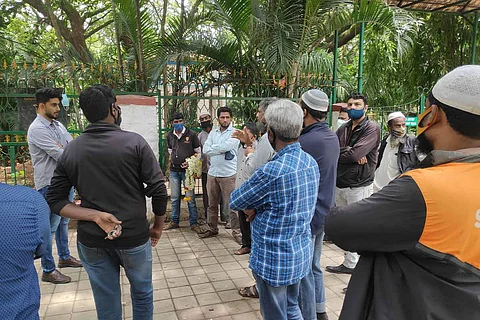

For the delivery executives of platforms such as Swiggy and Zomato, the seating decks outside the Richards Park in Bengaluru’s Frazer Town are a place where they often wait between their orders during the day. On Monday, August 23, however, a small group of 20 delivery executives convened at the park to take their discussion beyond their daily food deliveries.
There were posters in areas near the park, which read, the Delivery Boys Welfare Association (DBWA), an organisation working for the rights of gig workers in Bengaluru, was organising a meeting to discuss the legal issues they are facing. The posters, which were also shared online, had asked delivery executives to come to the park on Monday morning.
“There is a need to hold these kinds of meetings because when delivery executives have an issue, there is no point person to help them resolve it. The call centre and the chat support (of the platform companies) can be unresponsive at times. It is important that they feel there is someone looking out for their rights,” says Dathathreya Raju BM, a businessman who started the Delivery Boys Welfare Association.
This is not the first time the delivery workers have gathered to discuss how they can improve their lives. There have been similar meetings held by multiple groups in Bengaluru. In the last three months, the United Food Delivery Partners’ Union (UFDPU), another organisation working for the rights of gig workers, has held protests over a COVID-19 relief package, priority vaccination and the fuel price hike.
Among these three topics, the fuel price hike was the subject of heated discussion on Monday morning at Richards Park. “I now end up spending Rs 350 in a day on just fuel and my daily earnings have dropped,” says Ahmed*, a 42-year-old Swiggy delivery executive who has been working in and around Frazer Town for three years.
Gig workers like him do not get entitlements that salaried workers get and they are labelled as independent contractors, which means they do not have an employer who will take responsibility for them. The algorithm and the incentive model also drive them to ride hundreds of kilometres in cities. These issues are not new but in the COVID-19 pandemic, the delivery workers say, they are facing a steep drop in their earnings.
On August 12, Ahmed earned Rs 1,032 through Swiggy’s daily incentive of Rs 230, which, he says, is initiated when he works for 10 hours and earns Rs 720 on the platform in a day. On this particular day, he earned the highest this month as he worked 12 hours 55 minutes. “There are also days when I work all day and don’t trigger the incentive,” Ahmed says.
The daily incentives differ with Swiggy and Zomato and are decided based on a number of factors, primarily, the distance travelled.
Ahmed raised these concerns at the meeting on Monday and there was a concurrence among the other workers. “We have been working longer hours but the incentives that were there two years ago are no longer there. The weekly and monthly incentives are no longer there,” says Ahmed.
The meeting in Bengaluru comes at a time when gig workers have taken to social media to bring attention to the fact that their earnings have plummeted. The base pay and incentive models were changed in 2020 amid the pandemic, according to researchers whom TNM had spoken to, and there is little government support since such workers are not full-time employees. As labour falls under the Concurrent List, both states and the Union government can make laws.
In September 2020, the Lok Sabha had passed the Code on Social Security, the first attempt to cover gig workers under the ambit of the law. The Union government, however, is yet to notify the bill and has not issued directions to states. The draft bill mentions benefits such as disability cover, accident insurance, health and maternity benefits and directions to companies to contribute to a social security fund. “We are planning to send a memorandum to both the state and Union government to recognise delivery executives and rightfully get them labour entitlements,” says Dathathreya. “But we don’t believe unionising and striking is going to help much since these workers are not Swiggy employees in the first place,” he adds.
The anonymous Twitter account Delivery Bhoy, which has been vocal about delivery workers rights, also made a similar point last week, explaining how other companies such as Rapido and Shadowfax can also provide contracted labour.
Many have asked me why not strike or form a union. With the current gig work model they've very smartly defined their relationship with the worker. It helps them skirt labour laws. There is, however a solution, but it requires one Indian to stand up for another. Here it is: pic.twitter.com/NZMbNVxbPp
— Delivery Bhoy (@DeliveryBhoy) August 15, 2021